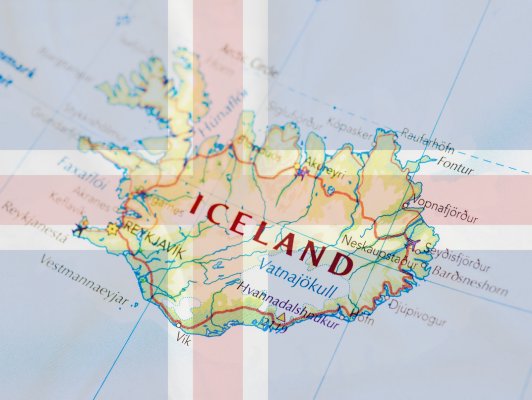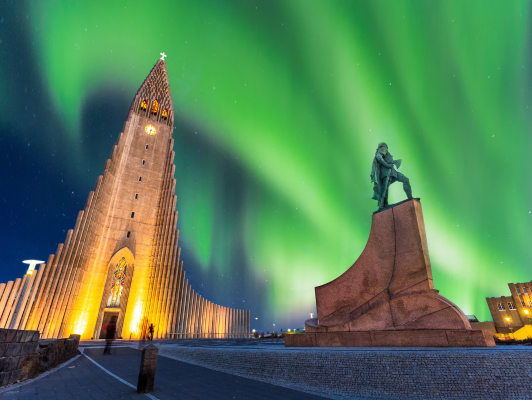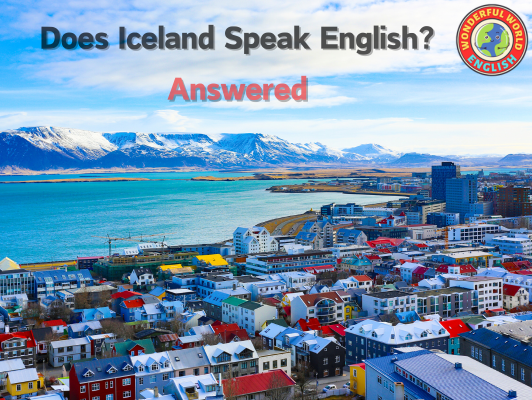Contents
Toggle
Meet David De’ Ath, founder, editor, and writer at Wonderful World English. With his extensive background as an English teacher, David provides valuable insights and practical tips on ESL for students and teachers alike.
Iceland, a nation renowned for its striking landscapes and cultural heritage, boasts a high literacy rate and a strong educational system.
This has contributed to the multilingual capabilities of its population.
While Icelandic is the country’s official language, rooted in its Nordic heritage, the importance of English in global discourse has not been overlooked in Iceland’s education policies.
English is taught as a second language from a young age, and other Scandinavian languages are also part of the curriculum.
Travelers to Iceland, particularly to the capital city of Reykjavik, often find language barriers minimal as many Icelanders converse in fluent English. About 98% of Icelanders can speak English. This remarkably high English proficiency rate is due to the country’s strong emphasis on learning English as a second language from an early age in schools.
This proficiency in English facilitates tourism and offers a comfortable experience for English-speaking visitors.
The integration of English into Icelandic society has not diminished the value placed on the Icelandic language, which remains a core part of the nation’s identity.
Instead, Icelanders’ widespread knowledge of English and other languages is seen as a complement, enhancing both international communication and cultural exchange.

Language Landscape in Iceland
Iceland’s linguistic environment is defined by the strong presence of the Icelandic language, a nod to historical roots, a multilingual populace, and a comprehensive education system emphasizing language studies.
Icelandic as the Official Language
Icelandic holds the official language status in Iceland, serving as a key medium of communication and cultural identity.
It hails from Old Norse, the language of the Icelandic Sagas, and has preserved much of its original grammar and vocabulary over centuries.
Efforts are constantly made to adapt Icelandic to modern needs, distinguishing it from other Nordic countries.
Historical Influence on Icelandic
The Icelandic language has changed little since the arrival of Norse settlers in the 9th century.
This can be attributed to Iceland’s geographical isolation and the nation’s commitment to preserving its literary heritage.
Even under Danish rule, Icelandic maintained its importance, resisting the linguistic influences often following political domination.
Multilingual Population
While Icelandic is the primary language, English and Danish are widely spoken across Iceland, reflecting an increasingly multilingual population.
Speakers often possess a working knowledge of these languages, ensuring effective communication with the global community.
English, in particular, has gained strong traction, especially in the business and tourism sectors.
Iceland is renowned for being very safe and is a desirable destination for many.
For a complete list of the best English-speaking countries in the world according to the updated Quality of Living Index, check out the guide below!
Related: Best English-Speaking Countries to Live in (Top 12)
The Education System and Languages
The education system of Iceland mandates the study of languages. Schools include English and Danish (or another Scandinavian language) as compulsory subjects.
Further, languages such as German, Spanish, and French are commonly offered, demonstrating Iceland’s recognition of the value of multilingual proficiency for its students’ future opportunities.
The language landscape in Iceland offers a rich tapestry of linguistic variety, historic fidelity, and educational commitment through adherence to tradition and an embrace of linguistic diversity.

The Role of English in Iceland
English plays a significant role in Iceland, serving as a critical gateway for international communication, particularly in tourism, education, and daily interactions among Icelanders.
Prevalence of English Among Icelanders
In Iceland, English is widely spoken, with a large percentage of the population proficient in it.
It functions as a second language for many, following the native Icelandic.
English literacy rates are high due to a strong emphasis on language education, which includes English alongside Scandinavian languages and Icelandic.
Tourism and the Adoption of English
The tourism industry has been a driving force in the adoption of English in Iceland.
This is evident in urban areas and popular tourist destinations where signs, menus, and information are often available in English to accommodate international travelers.
Tourism has cultivated an environment conducive to language learning and immersion in English.
English Proficiency and Education
Iceland’s education system places great importance on language education.
Icelandic students are taught English from a young age, complemented by higher education curriculums, preparing them for global communication.
Language education policies have led to high English proficiency rates, aligning with Iceland’s linguistic diversity, including Polish, Lithuanian, Portuguese, Filipino, Thai, Latvian, and more.
Although Iceland is not a member of the European Union (EU), it is a part of Europe.
For a list of the most English-proficient countries in the EU, check out the guide below!
Related: English-Speaking Countries in the EU – Top 10
Practical Use of English in Daily Life
English is not just limited to tourism and education in Iceland; it’s part of everyday life.
Icelanders commonly use English for communication with non-Icelandic speakers and in diverse settings.
As a reflection of linguistic purism, there’s an effort to maintain the Icelandic language, but everyday practices show the practical use of English, including understanding basic English phrases in the local culture.

Conclusion
In wrapping up the exploration of English language proficiency in Iceland, it’s clear that the nation stands as a beacon of multilingualism and linguistic adaptability.
Iceland, with its deep-rooted historical and cultural traditions, has embraced English without compromising the integrity of its native language, Icelandic.
The widespread proficiency in English among Icelanders is a testament to the country’s robust education system, which prioritizes language learning from a young age.
The role of English in Iceland extends beyond tourism and education, permeating daily life and facilitating global communication.
This linguistic duality enriches the Icelandic culture, allowing for a seamless blend of preserving tradition while engaging in the global community.
The presence of English in Iceland does not detract from the Icelandic identity; instead, it connects Iceland to the broader world, enhancing cultural exchange and mutual understanding.
As Iceland continues to navigate its place within the global community, the proficiency of its people in English and other languages will undoubtedly remain a key asset.
We hope you found value in this information.
Have a wonderful day!
Image Attribution: All images licensed via canva.com





